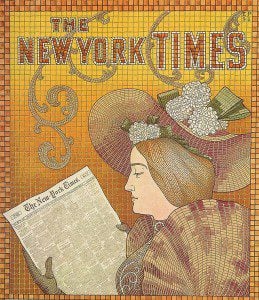 I found this excerpt in a New York Times piece on the actor, Rupert Everett. Entitled “Rupert Everett Is Not Having a Mid-Life Crisis,” the article by Alex Witchel ends up showing how sad and unfulfilled Everett seems to be.
I found this excerpt in a New York Times piece on the actor, Rupert Everett. Entitled “Rupert Everett Is Not Having a Mid-Life Crisis,” the article by Alex Witchel ends up showing how sad and unfulfilled Everett seems to be.
In the midst of the sadness, however, Witchel narrates a hilarious scene in which Everett meets with a psychic medium in order to commune with the spirit of Oscar Wilde, whom Everett has written a play about. The following sad but funny scene shows just how confused this sort of thing end up being:
The seance begins:
“I was told to do a regular reading,” she said briskly, setting a pack of Tarot cards on the table. Everett looked decidedly dismayed. Having written a screenplay about the last three years of Oscar Wilde’s life — a part he would like to play — he wanted to contact him, take a meeting, perhaps.
“I’m also a handwriting analyst,” Roberts said quickly, feeling the goodwill drain from the room. She set a piece of paper before Everett. “Please write a sentence and a signature.” He kept his composure while doing so, though his eye wandered to his watch with hopes for an earlier lunch. In the two lunches and one breakfast I ate with Everett, he was continually famished, eating my food as well as his own.
“I live in New York City and my name is Rupert Everett,” he wrote as instructed.
Roberts glanced at the writing. “You have enormous inner resources,” she said. “There are fairly wide spaces between your words. Metaphorically you need a lot of space around you.”
Everett stared glumly at the paper.
The analysis commences:
“Your attention to detail is not the most natural part of your personality,” she went on. “When writing the word ‘city,’ you omitted a T-bar. It’s unusual to omit a T-bar. It’s so rare it’s not actually covered.” He hadn’t crossed any of the T’s in his name either. “You’ve got a lot of mixed messages,” Roberts went on. “The warmth in the broad handwriting, yet this” — she pointed to something on the paper — “cuts out people.”
“Frosty,” he said.
“Well, I was going to be a bit more polite.”
He shrugged. “I come from a very frosty family.”
She kept going: “A live-in relationship broke. The effect has softened, but it’s still showing. Your signature says, ‘Don’t imagine you’ll get close to me easily.’ ” Now he looked disturbed.
I asked Roberts about her work as a medium. She said she appeared on “A Current Affair” to “read” the bed used by Joe DiMaggio and Marilyn Monroe. “I wasn’t expecting anything when I touched it,” she said, her tone turning dramatic. “But when I get spirit contact, it hits the back of my shoulders.”
Everett’s tone turned impatient. “Can’t you get some now?”
“You can’t just conjure up anybody,” she protested. “In that bed the essence was still there. I burst into tears!”
“Bursting into tears is the easiest thing in the book, actually,” he said.
“Is it?” she asked, deflated. Everett recanted.
“Poor old Marilyn,” he said encouragingly. “What else did you think about her?”
Roberts rebounded. “She was in a fetal position, positively sobbing her heart out. You know, I have super psi,” she went on animatedly. “An ability to move back in time.”
“I wish you’d do a bit of that now,” Everett said.
The medium backpedals, desperately making excuses for her lack of communion with the dead:
I tried steering her back to Oscar Wilde. “You can’t call a specific person,” she said. “If Oscar Wilde is interested in us and we were in a place with some significance to him, maybe. But if he did appear, it would have to be what he wanted to do. Oscar Wilde as one being no longer exists. The essence becomes diffuse, perhaps reincarnated, and has moved on.”
Now Everett and I were both glum. Roberts bravely kept talking. “Rudolf Valentino appears quite regularly at séances,” she confided. “Houdini never does.”
“Versace invariably arrives late,” Everett offered.
Uh-oh. Dialogue again. It was time to wrap up.
Would the show be a hit? I asked her. “Absolutely,” she warbled.”
This is a sad story, and we certainly don’t want to laugh at the lostness of the people involved. It is not by mistake, however, that one sees in the midst of this scene–which plays exactly like a Rupert Everett movie would (his 15 scene-dominating minutes in “My Best Friend’s Wedding” are just about the funniest 15 minutes you can find)–the desperation the natural man feels for some kind of greater perspective, some higher guidance, that will give him direction and confidence for life.
Having turned one’s back on God, to whom else may one turn? In the case of this actor, one of the first to openly declare himself a homosexual, the answer is to a phony. Throughout the piece, the sadness of Everett’s life makes itself abundantly clear. He has followed his own course throughout life, and it has not led him to happiness, but to a certain resignation and sense of defeat.
The hilarious scene recounted above aside, one is moved by such narratives to pray for those who seek something, anything, to salve their wounds, cleanse their sins, and guide their steps. There is, in the end, no one other than Christ to whom man may turn, no other Way he may find but the one that is broad and leads to destruction.
(Photo: Richard Burbridge for the NYT)











